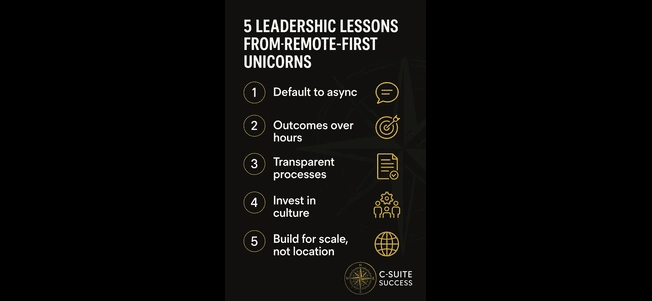Leadership Lessons from Remote-First Unicorns

-
- 1. Default to Asynchronous Communication
- 2. Manage Outcomes, Not Hours
- 3. Prioritize Radical Transparency
- 4. Design Culture, Don’t Let It Drift
- 5. Hire for Reach, Not Region
- Final Thought:
Disclosure: Some of the links in this article may be affiliate links, which can provide compensation to me at no cost to you if you decide to purchase. This site is not intended to provide financial advice and is for entertainment only.
The most successful remote-first companies didn’t treat remote work as a temporary fix. They built it into their DNA and, in doing so, created billion-dollar businesses that thrive without borders.
At C-Suite Success, we studied what sets these unicorns apart. Here are five leadership principles behind their remote advantage:
1. Default to Asynchronous Communication
Remote-first unicorns like GitLab and Zapier prioritize written, asynchronous communication. Why? It creates clarity, reduces meetings, and respects time zones. Leaders document decisions, expectations, and processes so the organization can run without real-time bottlenecks.
2. Manage Outcomes, Not Hours
Companies like Notion don’t track time; they track results. They focus on what gets done, not how long it took. This shift in mindset builds autonomy and accountability across teams.
3. Prioritize Radical Transparency
Remote success demands clear expectations and open access to information. GitLab’s entire handbook is public for a reason: transparency reduces misalignment and speeds up onboarding. Leaders in remote-first orgs embrace openness, even when it's uncomfortable.
4. Design Culture, Don’t Let It Drift
“Remote” doesn’t mean “disconnected.” The best distributed teams are intentional about culture. From virtual rituals to leadership AMA sessions, they foster trust and connection on purpose, not by accident.
5. Hire for Reach, Not Region
Remote-first unicorns tap into global talent markets. They’ve realized the best person for the job may not be in the same time zone. Leadership adapts workflows and expectations to support asynchronous collaboration across continents.
Final Thought:
Remote-first unicorns didn’t succeed in spite of remote work; they succeeded because of it.
If you're leading a distributed team or scaling a remote company, these lessons are your playbook.
Want help implementing them? Let’s talk.
-
- 1. Default to Asynchronous Communication
- 2. Manage Outcomes, Not Hours
- 3. Prioritize Radical Transparency
- 4. Design Culture, Don’t Let It Drift
- 5. Hire for Reach, Not Region
- Final Thought:
Disclosure: Some of the links in this article may be affiliate links, which can provide compensation to me at no cost to you if you decide to purchase. This site is not intended to provide financial advice and is for entertainment only.
